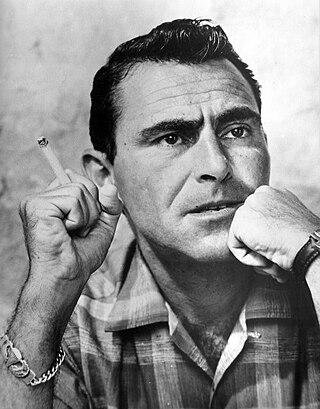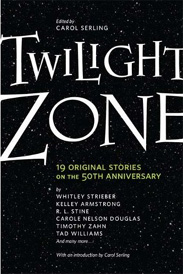Related Research Articles

The Twilight Zone is an American media franchise based on the anthology television series created by Rod Serling in which characters find themselves dealing with often disturbing or unusual events, an experience described as entering "the Twilight Zone". The episodes are in various genres, including fantasy, science fiction, absurdism, dystopian fiction, suspense, horror, supernatural drama, black comedy, and psychological thriller, frequently concluding with a macabre or unexpected twist, and usually with a moral. A popular and critical success, it introduced many Americans to common science fiction and fantasy tropes. The first series, shot entirely in black-and-white, ran on CBS for five seasons from 1959 to 1964.

Rodman Edward Serling was an American screenwriter and television producer best known for his live television dramas of the 1950s and his anthology television series The Twilight Zone. Serling was active in politics, both on and off the screen, and helped form television industry standards. He was known as the "angry young man" of Hollywood, clashing with television executives and sponsors over a wide range of issues, including censorship, racism, and war.

"Where Is Everybody?" is the first episode of the American anthology television series The Twilight Zone and was originally broadcast on 2 October 1959, on CBS. It is one of the most realistic Twilight Zone episodes, as it features no supernatural elements and is based on fairly straightforward extrapolation of science.
"Mr. Denton on Doomsday" is episode three of the American television anthology series The Twilight Zone. It originally aired on October 16, 1959, on CBS. It was the first Twilight Zone episode to be rerun.
"Walking Distance" is episode five of the American television series The Twilight Zone. It originally aired on October 30, 1959. The episode was listed as the ninth best episode in the history of The Twilight Zone by Time magazine.

"Time Enough at Last" is the eighth episode of the American anthology series The Twilight Zone, first airing on November 20, 1959. The episode was adapted from a short story by Lynn Venable, which appeared in the January 1953 edition of If: Worlds of Science Fiction.
"I Shot an Arrow into the Air" is the fifteenth episode of the American television anthology series The Twilight Zone.
"The Invaders" is episode 15 of season 2 of the American television anthology series The Twilight Zone. The episode, which originally aired January 27, 1961, starred Agnes Moorehead. It was written by Richard Matheson, directed by Douglas Heyes, and scored by Jerry Goldsmith. Distinctive features of this episode include a near-solo performance by one character, and an almost complete lack of dialogue. The only dialogue in the entire episode aside from Rod Serling's usual narration came from Douglas Hayes, the episode's director. In addition, this is the only episode in which Rod Serling gives his opening monologue at the start of the prologue, rather than the end. The protagonist portrayed by Agnes Moorehead often cries out in pain and terror, but never speaks.
"The Rip Van Winkle Caper" is episode 60 of the American television anthology series The Twilight Zone, and is the 24th episode of the second season. It originally aired on April 21, 1961 on CBS, and was written by series creator and showrunner Rod Serling, and was directed by Justus Addiss.

"The Obsolete Man" is episode 65 of the American television anthology series The Twilight Zone, starring Burgess Meredith as Romney Wordsworth, the accused, and Fritz Weaver as the Chancellor. It originally aired on June 2, 1961, on CBS. The story was later adapted for The Twilight Zone Radio Dramas starring Jason Alexander as Wordsworth.
"The Passersby" is the 69th episode of the American television anthology series The Twilight Zone. It was written by series creator and showrunner Rod Serling.
"It's a Good Life" is the eighth episode of the third season of the American television series The Twilight Zone, and the 73rd overall. It was written by series creator/showrunner Rod Serling, based on the 1953 short story "It's a Good Life" by Jerome Bixby. The episode was directed by James Sheldon, and is considered by some, such as Time and TV Guide, to be one of the best episodes of the series. It originally aired on November 3, 1961. The episode was one of four from the original 1959 series which formed the basis of the 1983 film Twilight Zone: The Movie.
"The Last Rites of Jeff Myrtlebank" is episode 88 of the American television anthology series The Twilight Zone. It originally aired on February 23, 1962 on CBS.
"He's Alive" is episode four of the fourth season of The Twilight Zone. It tells of an American neo-Nazi who is visited by the ghost of Adolf Hitler. Writer Rod Serling scripted a longer version of the teleplay to be made into a feature-length film, but it was never produced. This episode is notable for Dennis Hopper's breakout performance as Peter Vollmer.
"I Am the Night—Color Me Black" is episode 146 of the American television anthology series The Twilight Zone. It originally aired on March 27, 1964 on CBS.

The Twilight Zone is an American fantasy science fiction horror anthology television series created and presented by Rod Serling, which ran for five seasons on CBS from October 2, 1959, to June 19, 1964. Each episode presents a standalone story in which characters find themselves dealing with often disturbing or unusual events, an experience described as entering "the Twilight Zone", often with a surprise ending and a moral. Although often considered predominantly science-fiction, the show's paranormal and Kafkaesque events leaned the show much closer to fantasy and horror. The phrase "twilight zone" has entered the vernacular, used to describe surreal experiences.
"A Quality of Mercy" is episode 80 of the American television anthology series The Twilight Zone, which originally aired on December 29, 1961. The title is taken from a notable speech in William Shakespeare's The Merchant of Venice, quoted in Serling's closing narration at the end of the episode.
"The Long Morrow" is episode 135 of the American television anthology series The Twilight Zone. It originally aired on January 10, 1964 on CBS. In this episode, an astronaut falls in love on the eve of a 40-year-long space voyage. The story focuses on how he and his lover confront the problem that his 40 years in suspended animation will cause a wide age disparity between them by the time he returns.
"Mr. Garrity and the Graves" is an episode of the American anthology television series The Twilight Zone.

Twilight Zone: 19 Original Stories on the 50th Anniversary is an anthology of short stories written by various authors and edited by Carol Serling, the widow of series creator Rod Serling. Each story was written with themes or styles similar to The Twilight Zone episodes, including a narrated introduction and conclusion. Authors who contributed stories include Twilight Zone veterans Earl Hamner Jr., Alan Brennert, William F. Wu, and Rod Serling. Reviewers listed some of the better stories as being Kelley Armstrong's "A Haunted House of Her Own", Alan Brennert's "Puowaina" and Mike Resnick and Lezli Robyn's "Benchwarmer".
References
- DeVoe, Bill. (2008). Trivia from The Twilight Zone. Albany, GA: Bear Manor Media. ISBN 978-1-59393-136-0
- Grams, Martin. (2008). The Twilight Zone: Unlocking the Door to a Television Classic. Churchville, MD: OTR Publishing. ISBN 978-0-9703310-9-0
Notes
- ↑ Warren, Jason. "Twilight Zone: 'Time Enough at Last'". Scifilm — TV Files. Retrieved 20 July 2006.
- ↑ Barr, Valerie (8 January 1999). "Movies Involving Computers (or raising interesting issues for a computer ethics course)" . Retrieved 30 July 2006.
- ↑ Blass, Laurie & Elder, Pam. "LESSON PLAN". Twilight Zone: Cable in the Classroom. Archived from the original on 26 March 2007. Retrieved 30 July 2006.
- ↑ Sarris, Andrew. Rod Serling: Viewed From Beyond the Twilight Zone. Rod Serling's The Twilight Zone Magazine, March–April 1985, p. 45